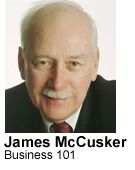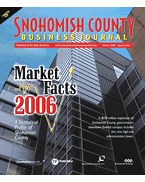 |
|
|
YOUR
COUNTY.
|
YOUR
BUSINESS JOURNAL.
|
Published March 2006
Grammar
still applies
when ‘talking’ via e-mail
 If
you want to communicate with anybody these days, you’ve got a lot of competition.
Most of us live and work in an “information rich” environment that includes
a daily barrage of signals and messages of one sort or another, each competing
for our attention.
If
you want to communicate with anybody these days, you’ve got a lot of competition.
Most of us live and work in an “information rich” environment that includes
a daily barrage of signals and messages of one sort or another, each competing
for our attention.
The engineers have a name for this kind of competition — “noise” — and it is no friend to management.
For managers to communicate effectively with their workers, with each other and with their superiors, they somehow have to get their message through despite all the noise. It isn’t easy.
Claude Shannon, a mathematician and engineer working at Bell Labs, developed the theory of communications into what came to be called “Shannon’s Law.” Essentially, what his equations come down to is that transmitting information effectively is a function of two things: bandwidth and something called the “signal-to-noise” ratio.
Most business communications are sent and received in one of four ways: spoken face-to-face, spoken via telephone, e-mail, and written letters, reports, forms and memos.
Generally, the face-to-face spoken communications method, or channel, has the broadest bandwidth. And even though there has been an appalling decline in listening skills, if the person you are talking to isn’t distracted by other things — such as a ringing cell phone or other incoming messages — this type of communications also has the lowest signal-to-noise ratio.
Thoughts expressed face-to-face through the spoken word also have the benefit of our expressions and gestures to help ensure the accuracy of the communication. Moreover, face-to-face communications allow the sender to see the response to the message and assess whether it was correctly understood.
The face-to-face channel has the additional advantage of being the form of communication that most of us are naturally best at.
Even here, though, communications efficiency can be affected by the setting. A department or team meeting, for example, involves face-to-face communications of a very different type than a discussion between two colleagues. And communications channel noise problems can emerge because of differences in perspective, vocabulary, environment, experience and personality.
The next highest bandwidth communications channel is the telephone. Here, too, we have the advantage of capturing the attention of the person we are talking with, at least initially, and to use the inflexion in our voices to clarify our message and express it effectively. Some people are better than others at using the telephone, but while it is more demanding than face-to-face (because of the narrower bandwidth) most of us can still get by.
There is a major drop-off in bandwidth when we move from the spoken word of face-to-face and telephone to the written word of e-mails and letters. Unfortunately, there is also considerable deterioration in the signal-to-noise ratio. Smaller bandwidth and increased noise mean that written communications are generally much more demanding than spoken ones.
Even though written communications are more demanding, managers are increasingly turning to e-mail — at the expense of every other form of communication. A recent survey of business managers conducted for the staffing firm Robert Half indicates that e-mail is far and away the most often used communications method. Moreover, in the past five years, the use of e-mail has tripled and is now used for nearly three-fourths of all business communications. Telephone usage and face-to-face communication get to split up the remainder.
The rapid growth of e-mail certainly has its advantages — it is master of the constraints of time and geography, just to name two — and they are less intrusive and therefore less disruptive of workplace efficiency.
E-mail communications do require higher levels of language skills, though. Their clarity depends on grammar, syntax, spelling and vocabulary — the very things which school neglect and decades of television have eroded almost beyond recognition.
As an individual manager, we probably can’t do much about the overall trend toward e-mail communications. What we must do, then, is make sure that our writing skills are working for us rather than against us.
The single most important thing you can do is to avoid the language errors that mark us as either careless or not leadership material. To start with, if your e-mail system doesn’t provide grammar and spelling checks, don’t simply trust your own proofreading and assume that your stuff is perfect. Write your messages out on word-processing software that does check these things, correct the errors and then paste the result onto your system’s mail form.
Next, buy or borrow a grammar desk book. There are several good ones on the market today, and they really do help.
Grammar, syntax, spelling and vocabulary can be the building blocks of success, or the stepping stones to a stagnant career. And it is, as they say in Vegas, “your choice.”
James McCusker, a Bothell economist, educator and small-business consultant, writes “Your Business” in The Herald each Sunday. He can be reached by sending e-mail to otisrep@aol.com.











